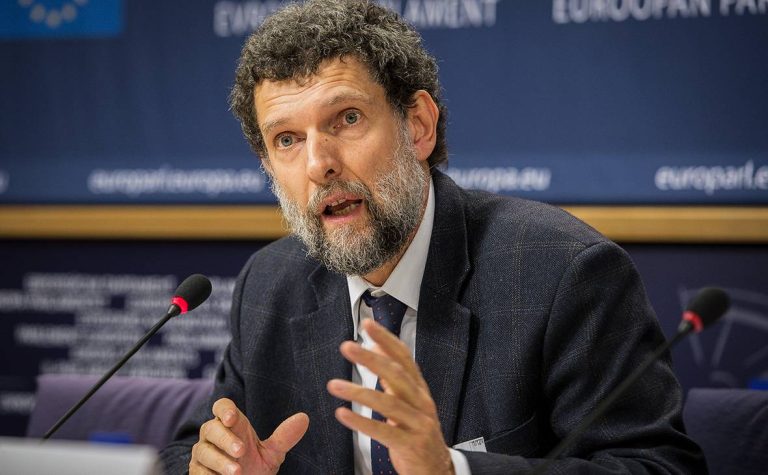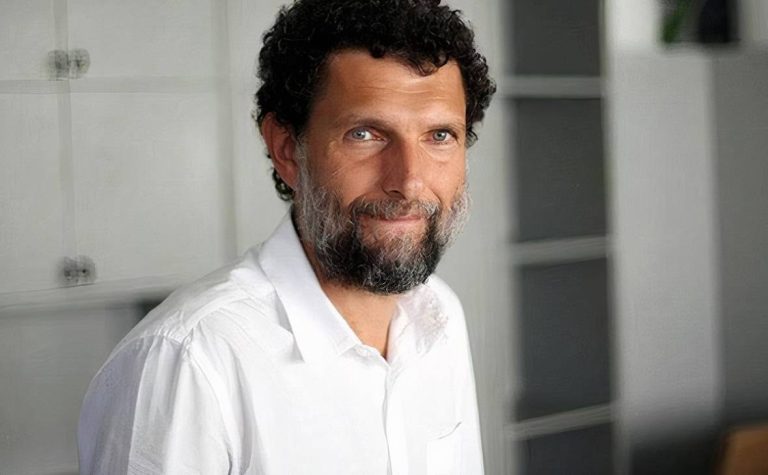In an unprecedented standoff between Turkey’s judiciary and international human rights law, Turkish philanthropist Osman Kavala remains behind bars despite a ruling by the European Court of Human Rights (ECHR). The court has ruled that his detention violates the European Convention on Human Rights. Yet, more than two years after his arrest, Turkish courts continue to extend his incarceration.
“There was no evidence in the case file that the applicant [Osman Kavala] had used force or violence, had instigated or led the violent acts perpetrated or had provided support for such criminal conduct,” the Strasbourg-based court noted in a December 2019 ruling. The ECHR also noted that charges are politically motivated and have no legal merit. Despite this ruling, Turkish authorities have repeatedly extended Kavala’s detention, with no end in sight.
The continued detention of Osman Kavala has triggered sharp rebukes from across Europe. In a letter to The Financial Times, a group of esteemed political figures, including former Swedish Prime Minister Carl Bildt and former Secretary General of NATO Javier Solana, condemned Turkey’s defiance of the ECHR ruling.
“We strongly criticised the wholly unjustified imprisonment of the leading Turkish philanthropist Osman Kavala. He has been incarcerated ever since. Now the European Court of Human Rights has authoritatively confirmed our assessment,” the letter read. The authors, representing a broad spectrum of European political thought, were united in their concern over Turkey’s deteriorating human rights record. “In its treatment of Mr Kavala, Turkey is in clear breach of its commitments under the European Convention on Human Rights and has along the way alienated almost every friend it once had in Europe,” they wrote, referring to Turkey’s obligations as a member of the Council of Europe, of which the European Court of Human Rights is a key institution.
The letter emphasized that the indictment against Kavala did not allege any use of force—an essential element of the charges under Article 312 of the Turkish Penal Code, which concerns attempts to overthrow the government through violence. The absence of evidence linking Kavala to violent acts raises troubling questions about the political motivations behind his continued detention.
A Legal System Under Siege
Domestically, there has been growing dissent within Turkey’s legal community. In a show of solidarity, 12 bar associations representing two-thirds of Turkey’s legal professionals issued a joint statement in January 2020 condemning the 30th Assize Court of Istanbul for its handling of Kavala’s case. The statement decried what it called “a trial system based on arbitrariness, with a predetermined outcome, and witnesses whose evidence will be withheld from the defense, [which] will never be fair.”
Despite these protests, the Turkish courts, widely seen as operating under the influence of political directives from the President Erdoğan government, have continued to ignore both domestic and international calls for Kavala’s release. Critics argue that this defiance is part of a broader trend of Turkey’s judicial system being used to stifle dissent and silence critics of the regime.
Turkey’s International Standing at Risk
Turkey’s refusal to comply with the ECHR ruling is not without consequences. As a member of the Council of Europe, Turkey is legally bound to uphold the rulings of the European Court of Human Rights. Continued non-compliance risks further isolating the country on the international stage, especially among its European partners. Relations between Turkey and the European Union have already been strained by Turkey’s crackdowns on journalists, academics, and political opposition figures in the wake of the 2016 coup attempt.
Turkey’s ongoing refusal to meet its legal obligations under the European Convention on Human Rights puts its ties with Europe at growing risk. As the situation drags on, it’s becoming evident that this case is a key test of the country’s commitment to the rule of law and its standing within the broader European legal system.
As European and Turkish legal experts have pointed out, compliance with the European Court of Human Rights is not optional for Council of Europe members. Yet, Turkey’s unwillingness to release Kavala signals a dangerous disregard for the principles of justice and human rights that underpin the European legal system.
With each passing day that Kavala remains in prison, the pressure mounts on Turkey to adhere to its international obligations. However, whether the Turkish government will choose to release Kavala and realign itself with European legal standards, or continue its path toward increasing authoritarianism, remains an open question.
The Fight for Justice Continues
As Pastor Andrew Brunson, who was similarly detained in Turkey, explained: “There was an overwhelming feeling of isolation in prison… The entire justice system is really serving the purposes of one man. This leads to not only isolation but hopelessness—there was nothing I could do to truly defend myself. I knew I was innocent, the judges knew I was innocent, but we all knew the judges would deliver whatever verdict they were ordered to give.” His words emphasise the deep sense of injustice and powerlessness that prisoners like Osman Kavala continue to face under a system widely criticized for its lack of independence.
Osman Kavala’s case has ignited a much-needed conversation about the state of democracy and human rights in Turkey. For his supporters, the fight is far from over. With mounting international pressure and criticism from Turkey’s own legal community, the future of this prominent philanthropist (and, by extension, the integrity of Turkey’s legal system) hangs in the balance.






